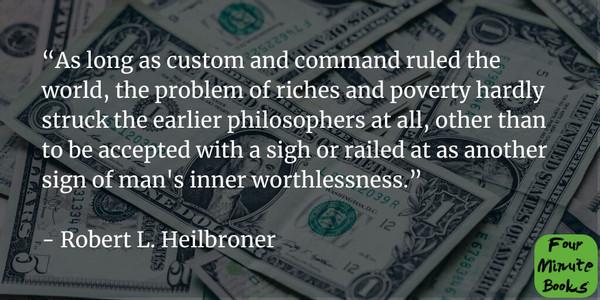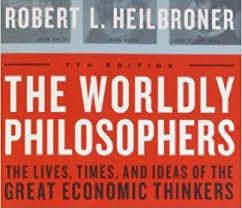The Worldly Philosophers Summary
Curated from: fourminutebooks.com
Ideas, facts & insights covering these topics:
13 ideas
·1.63K reads
11
Explore the World's Best Ideas
Join today and uncover 100+ curated journeys from 50+ topics. Unlock access to our mobile app with extensive features.
The Worldly Philosophers – Book Summary
The Worldly Philosophers is your hands-on guide to economics, how the world works overall but especially from a financial point of view, what are the social and economic systems that existed throughout history, and how certain people’s concepts got to shape the world we know today.
The Worldly Philosophers is a comprehensive and engaging book that provides readers with a thorough understanding of the development of modern economic philosophy. The book received favorable reviews from the New York Times. And it has received praise from various other publications as well.
16
264 reads
In a nutshell, it presents the world order from an economical point of view. Everything regarding macroeconomics these days is mathematical, social, political, and overall influenced by various events dating from centuries ago, all the way to our days.
The book follows these events and presents the natural evolution of humanity in relation to economics. It also highlights the major political and social winds and concepts that helped shape our world. And traces the roots of today’s socio-economical conditions.
15
198 reads
Here are three of the best lessons from the book:
- All economists sought to understand one common concept: how society works.
- A market ruled by tradition, coercion, and rules of the past is deemed to crash.
- Adam Smith is considered the father of modern economics due to his invaluable theory presented in 1776.
Economics is not complicated. But it’s fun and relevant. Don’t believe me? Let’s explore these three lessons in detail and you’ll see for yourself!
16
220 reads
Lesson 1: Regardless of their theories, every economist wanted to find out the single best way to organize a society.
Regardless of the theories they produced, every economist wanted to find out how to organize a society in the best way, economically and socially speaking.
The economists’ quest for this holy grail underlies their seemingly disparate approaches and theories. Yet their shared desire has led them to develop numerous similar ideas.
We can broadly divide economic theory into two categories: microeconomics and macroeconomics. Microeconomics focuses on individual markets and how changes in prices, supply and demand affect them.
17
165 reads
Macroeconomics focuses on aggregating these individual markets into a single economy that we can measure in terms of total output, total employment, price levels, etc.
The economists who have had the greatest impact on our lives tried their best to measure these two economic concepts and find a way to integrate them into a successful formula for our society.
15
142 reads
Lesson 2: Efficient markets are driven by profits, freedom of choice and effective institutions.
History proves once again to be the teller of our present and future. And the best metric to analyze our actions and their consequences today. Actions of the past show how rulers who enforce their visions upon citizens and interfere with the economy and deemed to fall.
The 5-year economic plans in the Soviet Union, the forced labor in Egypt, or the enforced traditions and customs in China or India over the economic systems show that states are better left outside the economic machine. People should have freedom of choice in their economic endeavors.
17
108 reads
When states interfere, it should be only to create a legal and efficient environment for these markets to coexist in peace. No forced traditions, labor, or plans will do well in the long run, because people do not work efficiently under such rules.
To build efficient markets, states should build the right legal structures and interfere as rarely as possible. Because markets are efficient and regulate themselves. Adam Smith highly popularized this theory. However, it looks true when you look at the highly efficient markets today compared to the ones from the past century.
16
76 reads
Lesson 3: Adam Smith popularized a famous theory that is as relevant today as it was in 1776.
Many consider Adam Smith as the father of modern economics. That’s because he popularized a highly relevant piece of writing in 1776 titled “The Wealth of Nations”. This paper created a theory that provides a simple answer for how markets are highly efficient. And they regulate themselves through supply and demand.
The theory advocates for the Invisible Hand Mechanism, a concept that popularized the idea of a market determined by supply and demand in which states must not interfere. But only regulate what needs to be regulated, legally speaking.
15
81 reads
This market’s equilibrium point is reached at the intersection between the two forces. People set prices themselves, and due to competition, they will lower as much as they need to, or grow accordingly.
This theory also states that societies will grow at their own pace. And that they develop in time due to these natural laws of economics. He also popularized the Law of Population. The law states that people will have children at different times. But mostly only during good economic conditions.
15
63 reads
The Worldly Philosophers – Book Review
The Worldly Philosophers covers the lives and works of many of the most influential economists in history, providing detailed biographical information about each one and explaining what their contributions were.
It also provides an overview of how economic thought has developed over time and how it has affected our world. This book would be excellent for anyone who wants to learn more about how modern economics has evolved over time.
15
45 reads
Who would I recommend The Worldly Philosophers to?
The 30-year-old person who is passionate about economics and the biographies of major influential figures in the economy, the 22-year-old student who wants to study outside their curricula, or the 34-year-old stock market investor who wants to gain a deeper understanding of the field by studying macroeconomics from its fundamentals.
14
64 reads
Author Quote
“As long as custom and command ruled the world, the problem of riches and poverty hardly struck the earlier philosophers at all, other than to be accepted with a sign or railed at as another sign of man’s inner worthlessness”
-Robert L. Heilbroner
15
83 reads
IDEAS CURATED BY
CURATOR'S NOTE
The Worldly Philosophers - Book Review (Economics)
“
Tom Joad's ideas are part of this journey:
Learn more about philosophy with this collection
How to beat procrastination
How to enhance your creative thinking
How to create a smooth transition in a new endeavor
Related collections
Similar ideas
6 ideas
Adam Smith: The Father of Economics
investopedia.com
6 ideas
Adam Smith and "The Wealth of Nations"
investopedia.com
2 ideas
Read & Learn
20x Faster
without
deepstash
with
deepstash
with
deepstash
Personalized microlearning
—
100+ Learning Journeys
—
Access to 200,000+ ideas
—
Access to the mobile app
—
Unlimited idea saving
—
—
Unlimited history
—
—
Unlimited listening to ideas
—
—
Downloading & offline access
—
—
Supercharge your mind with one idea per day
Enter your email and spend 1 minute every day to learn something new.
I agree to receive email updates


